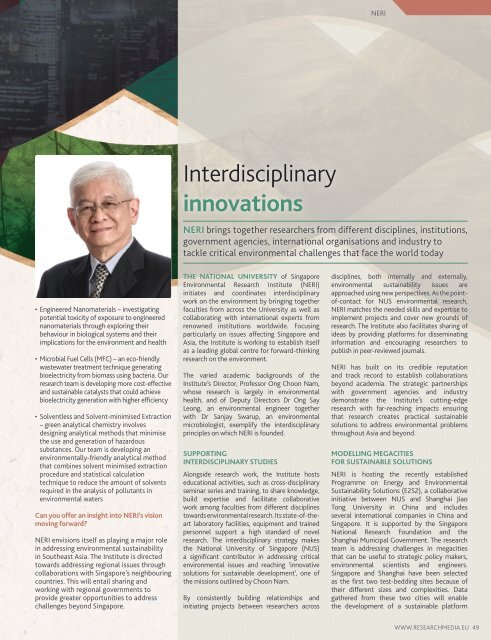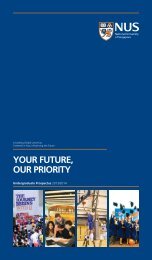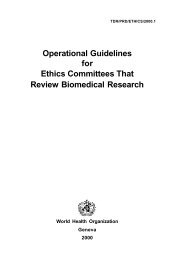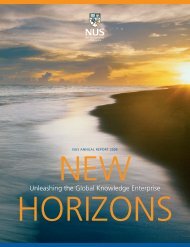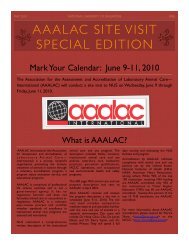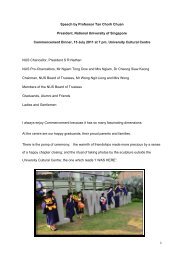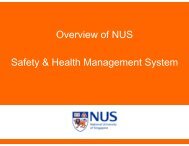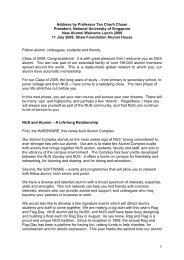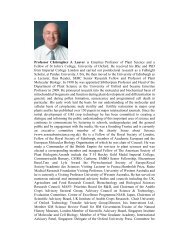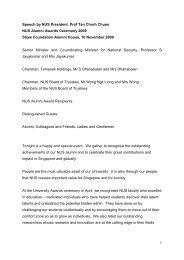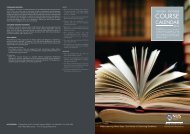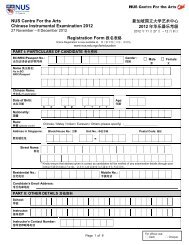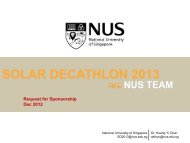to view the article featuring NERI
to view the article featuring NERI
to view the article featuring NERI
You also want an ePaper? Increase the reach of your titles
YUMPU automatically turns print PDFs into web optimized ePapers that Google loves.
<strong>NERI</strong><br />
Interdisciplinary<br />
innovations<br />
<strong>NERI</strong> brings <strong>to</strong>ge<strong>the</strong>r researchers from different disciplines, institutions,<br />
government agencies, international organisations and industry <strong>to</strong><br />
tackle critical environmental challenges that face <strong>the</strong> world <strong>to</strong>day<br />
• Engineered Nanomaterials – investigating<br />
potential <strong>to</strong>xicity of exposure <strong>to</strong> engineered<br />
nanomaterials through exploring <strong>the</strong>ir<br />
behaviour in biological systems and <strong>the</strong>ir<br />
implications for <strong>the</strong> environment and health<br />
• Microbial Fuel Cells (MFC) – an eco-friendly<br />
wastewater treatment technique generating<br />
bioelectricity from biomass using bacteria. Our<br />
research team is developing more cost-effective<br />
and sustainable catalysts that could achieve<br />
bioelectricity generation with higher efficiency<br />
• Solventless and Solvent-minimised Extraction<br />
– green analytical chemistry involves<br />
designing analytical methods that minimise<br />
<strong>the</strong> use and generation of hazardous<br />
substances. Our team is developing an<br />
environmentally-friendly analytical method<br />
that combines solvent minimised extraction<br />
procedure and statistical calculation<br />
technique <strong>to</strong> reduce <strong>the</strong> amount of solvents<br />
required in <strong>the</strong> analysis of pollutants in<br />
environmental waters<br />
Can you offer an insight in<strong>to</strong> <strong>NERI</strong>’s vision<br />
moving forward?<br />
<strong>NERI</strong> envisions itself as playing a major role<br />
in addressing environmental sustainability<br />
in Sou<strong>the</strong>ast Asia. The Institute is directed<br />
<strong>to</strong>wards addressing regional issues through<br />
collaborations with Singapore’s neighbouring<br />
countries. This will entail sharing and<br />
working with regional governments <strong>to</strong><br />
provide greater opportunities <strong>to</strong> address<br />
challenges beyond Singapore.<br />
THE NATIONAL UNIVERSITY of Singapore<br />
Environmental Research Institute (<strong>NERI</strong>)<br />
initiates and coordinates interdisciplinary<br />
work on <strong>the</strong> environment by bringing <strong>to</strong>ge<strong>the</strong>r<br />
faculties from across <strong>the</strong> University as well as<br />
collaborating with international experts from<br />
renowned institutions worldwide. Focusing<br />
particularly on issues affecting Singapore and<br />
Asia, <strong>the</strong> Institute is working <strong>to</strong> establish itself<br />
as a leading global centre for forward-thinking<br />
research on <strong>the</strong> environment.<br />
The varied academic backgrounds of <strong>the</strong><br />
Institute’s Direc<strong>to</strong>r, Professor Ong Choon Nam,<br />
whose research is largely in environmental<br />
health, and of Deputy Direc<strong>to</strong>rs Dr Ong Say<br />
Leong, an environmental engineer <strong>to</strong>ge<strong>the</strong>r<br />
with Dr Sanjay Swarup, an environmental<br />
microbiologist, exemplify <strong>the</strong> interdisciplinary<br />
principles on which <strong>NERI</strong> is founded.<br />
SUPPORTING<br />
INTERDISCIPLINARY STUDIES<br />
Alongside research work, <strong>the</strong> Institute hosts<br />
educational activities, such as cross-disciplinary<br />
seminar series and training, <strong>to</strong> share knowledge,<br />
build expertise and facilitate collaborative<br />
work among faculties from different disciplines<br />
<strong>to</strong>wards environmental research. Its state-of-<strong>the</strong>art<br />
labora<strong>to</strong>ry facilities, equipment and trained<br />
personnel support a high standard of novel<br />
research. The interdisciplinary strategy makes<br />
<strong>the</strong> National University of Singapore (NUS)<br />
a significant contribu<strong>to</strong>r in addressing critical<br />
environmental issues and reaching ‘innovative<br />
solutions for sustainable development’, one of<br />
<strong>the</strong> missions outlined by Choon Nam.<br />
By consistently building relationships and<br />
initiating projects between researchers across<br />
disciplines, both internally and externally,<br />
environmental sustainability issues are<br />
approached using new perspectives. As <strong>the</strong> poin<strong>to</strong>f-contact<br />
for NUS environmental research,<br />
<strong>NERI</strong> matches <strong>the</strong> needed skills and expertise <strong>to</strong><br />
implement projects and cover new grounds of<br />
research. The Institute also facilitates sharing of<br />
ideas by providing platforms for disseminating<br />
information and encouraging researchers <strong>to</strong><br />
publish in peer-re<strong>view</strong>ed journals.<br />
<strong>NERI</strong> has built on its credible reputation<br />
and track record <strong>to</strong> establish collaborations<br />
beyond academia. The strategic partnerships<br />
with government agencies and industry<br />
demonstrate <strong>the</strong> Institute’s cutting-edge<br />
research with far-reaching impacts ensuring<br />
that research creates practical sustainable<br />
solutions <strong>to</strong> address environmental problems<br />
throughout Asia and beyond.<br />
MODELLING MEGACITIES<br />
FOR SUSTAINABLE SOLUTIONS<br />
<strong>NERI</strong> is hosting <strong>the</strong> recently established<br />
Programme on Energy and Environmental<br />
Sustainability Solutions (E2S2), a collaborative<br />
initiative between NUS and Shanghai Jiao<br />
Tong University in China and includes<br />
several international companies in China and<br />
Singapore. It is supported by <strong>the</strong> Singapore<br />
National Research Foundation and <strong>the</strong><br />
Shanghai Municipal Government. The research<br />
team is addressing challenges in megacities<br />
that can be useful <strong>to</strong> strategic policy makers,<br />
environmental scientists and engineers.<br />
Singapore and Shanghai have been selected<br />
as <strong>the</strong> first two test-bedding sites because of<br />
<strong>the</strong>ir different sizes and complexities. Data<br />
ga<strong>the</strong>red from <strong>the</strong>se two cities will enable<br />
<strong>the</strong> development of a sustainable platform<br />
WWW.RESEARCHMEDIA.EU 49


